Welcome
....to JusticeGhana Group

JusticeGhana is a Non-Governmental [and-not-for- profit] Organization (NGO) with a strong belief in Justice, Security and Progress....” More Details
Mahama: African Leaders Must Own Their Economic Destiny
- Details
- Category: DateLines
- Created on Monday, 07 April 2014 00:00
- Hits: 4066
 Mahama: African Leaders Must Own Their Economic Destiny
Mahama: African Leaders Must Own Their Economic Destiny
President John Dramani Mahama has made a passionate appeal to African leaders to strive to restructure their economies as a way of taking their economic destinies into their own hands.
According to him, Africa’s economy is more of a colonial legacy and that needs to change so they meet the needs of its growing populace whilst supporting entrepreneurs.
The President made the appeal when he spoke as a guest speaker at the London School of Economics' Africa Summit in London.
The summit under the theme: "Emerging Trends in African Entrepreneurship" brought together various African business leaders to deliberate on the way forward for the continent and opportunities for entrepreneurship.
In his speech, President Mahama called for a radical restructuring of African economies whilst encouraging policies that promote and supports entrepreneurship on the continent.
“The Challenges that now face African entrepreneurs are actually vestiges’ of our colonialism, and the only way these challenges could be surmounted is if government work in partnership with the private sector to break out of these patterns and continue to create new paradigms,” he indicated.
According to him, the African entrepreneur has come of age and there is the need for state support to ensure they contribute meaningfully to the economy.
Reflecting on the struggles for independence and its impact on the economy, President Mahama indicated that Africa cannot claim to be liberated if its economy remains largely that of a colonial legacy, and as an impediment to the growth of entrepreneurs.
“For Africa to be fully liberated, it must be self-sufficient, our countries must be able to play a leading role in their own development; our countries must be able to take their economic destinies in their own hands," he noted.
President Mahama bemoaned the attitude of treating African entrepreneurs with suspicion, and warned that the phenomenon should not be encouraged.
He, however, urged various governments to put in place deliberate policies aimed at promoting and supporting entrepreneurs in all fields to engineer a level of growth in Africa.
The summit was attended by a host of business leaders including; Jim Ovia, founder of Zenith Bank Group, Herman Chinery- Hesse, founder of SoftTribe, Tutu Agyare founder and Managing Director of Nubuke Investment LLP, Zain Latif, founder of TLG capital.
Source: citifmonline.com
Hollande has 'no choice' on reform path
- Details
- Category: DateLines
- Created on Tuesday, 01 April 2014 00:00
- Hits: 3404
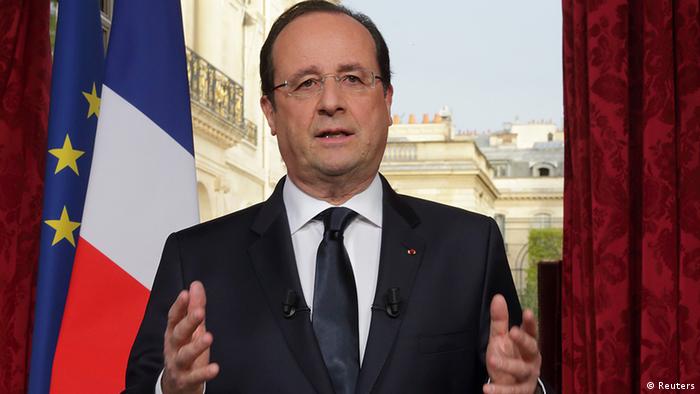 Hollande has 'no choice' on reform path
Hollande has 'no choice' on reform path
The Socialists' fiasco in the French local elections has piled pressure on President Francois Hollande. But it remains unlikely that he will alter his reform course - on the contrary.
François Hollande is not in an enviable position right now. Just one day after his Parti Socialiste suffered devastating local election results, he had more bad news to contend with - this time from the French National Institute for Statistics and Economic Studies (INSEE), who announced that national debt had risen to new heights - 93.5 percent of economic output. Not only that, the budget deficit was also higher than expected, at 4.3 percent.
{sidebar id=10 align=right}These numbers show that Hollande's economic reform program has not yet made an impact. And the election results show that Hollande's Socialists currently have little support among the population. For Carsten Brzeski, chief economist at the ING-Diba bank, these two signals are understandable. "People are dissatisfied because growth is weak and there is high unemployment," he says. "But I think the population doesn't know yet what is in store. The problem is there have hardly actually been any structural reforms yet."
New solutions
But Brzeski believes that reforms are necessary to reduce the debt and reinvigorate the labor market. "The French are in the same situation the Germans were at the start of the 2000s," he said. At the time, Chancellor Gerhard Schröder introduced a raft of reforms dubbed "Agenda 2010." They included a loosening of dismissal protection laws as well as reductions in unemployment benefit, health insurance, and pensions.
Brzeski thinks that France won't be able to avoid taking the same measures. "France has to free itself from the idea that help will come from outside," he said. The country used to keep its economy going by devaluing the franc or implement state-spending programs funded by debts. Both are now impossible, says Brzeski: "So the French are now faced with the difficult task of putting these reforms in place themselves."
The French government already began to make the job market more flexible a few months ago - while at the same time lifting some of the burdens on companies - points out Claire Demesmay of the German Council on Foreign Relations (DGAP). "The unions were included in the process, and major strikes were avoided," she told DW. "It's no Agenda 2010, but it's a first step."
'Responsibility Pact'
But it's also a step that strikes fear into the hearts of many French people. The "Responsibility Pact," as the reform package is known, has the same aim as the German reforms - the reduction in social benefits and the employees' rights. The Socialist Party's left-wing would like to scrap the plan altogether, but even the drubbing at the ballot box won't deter Hollande. "That's illusory, because both the financial markets and France's European partners are looking closely at what the government is doing," said Demesmay.
While the French president enjoys a lot more control over domestic policy than the German chancellor, his opponents are more powerful than their German counterparts too. "The unions in France are much less conciliatory - they have a culture of confrontation," said Demesmay. "Up until now Hollande has opted for a policy of small steps in order to protect his party colleagues and the population. But I don't know if he can maintain that after this election defeat."
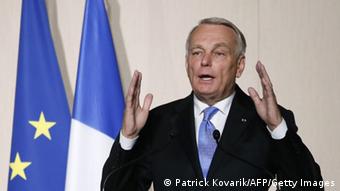 No way back?
No way back?
According to Demesmay, Hollande must now try to communicate more clearly than ever what is at stake. Prime Minister Jean-Marc Ayrault, who resigned following the election defeat, sees it the same way. The government "did not say clearly enough how difficult the country's situation is," he said. In short, there is unlikely to be any deviation in the reform path - at most, the weakest in society will receive a little more consideration.
A cabinet reshuffle won't change that reality, said Brzeski. "Hollande has no other choice but to stay the course," he said. "He can only hope that the first positive signs of a recovery will appear in time for his next presidential election campaign."
Then again, that recovery came too late to save Schröder in Germany. After his government introduced Agenda 2010, Schröder and his Social Democrats lost the population's approval and he had to concede defeat to Angela Merkel in the 2005 election.
Date 01.04.2014
Author Andreas Becker / bk
Editor Nicole Goebel
Source: Deutsche Welle
Putin's power play embraces Latin America
- Details
- Category: The World
- Created on Tuesday, 25 March 2014 00:00
- Hits: 4891
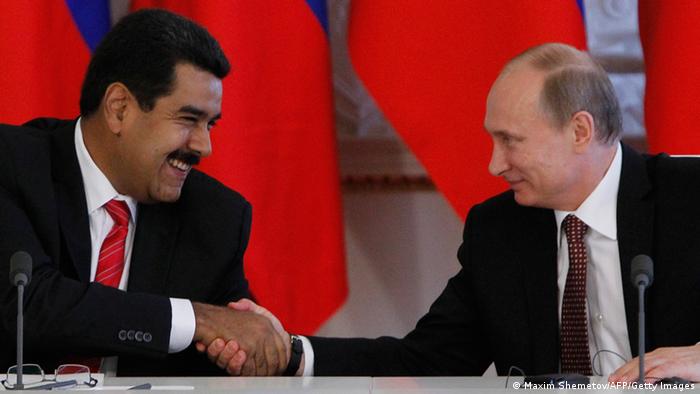 Putin's power play embraces Latin America
Putin's power play embraces Latin America
Russia is seeking to expand traditional ties with leftist Latin American states as part of renewed global-power ambitions, but reactions in Nicaragua, Cuba and Venezuela have been cautious.
In Venezuela, one of Russia's allies harking back to Soviet times, President Nicolas Maduro left no one in any doubt of his allegiance and support on Crimea while criticizing EU and US sanctions. "They want to surround Russia to weaken it, to crush it, to destroy it," he said in his weekly radio address last Wednesday.
While that is a clear endorsement of Russian President Vladimir Putin's actions in Crimea as well as the usual anti-US and Western rhetoric, Venezuela is less enamored with Russia's plans to extend its naval presence in Latin America by getting access to ports in the region. Foreign Minister Elias Jaua said that having a foreign military base in the country was against the constitution.
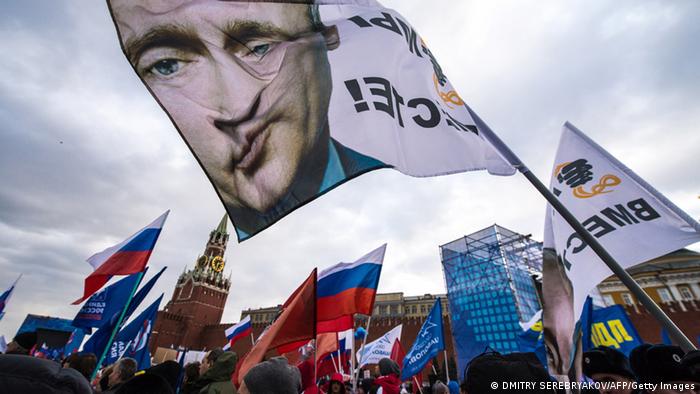
The reaction from Nicaragua's army chief, Julio Aviles, was similar - he said the plans were just "speculation," and that the constitution would only allow foreign access for humanitarian or training purposes.
There was little reaction from the Cuban government even after a Russian warship docked in Havana's harbor on February 27, a day after Russia's defense ministry announced plans to expand the country's worldwide military presence, in Latin America as well as North Africa and Asia.
Uneasy silence
"There's been a silence in some countries that speaks for itself," Claudia Detsch from Germany's Friedrich-Ebert Foundation in Argentina, told DW. "There is a certain uneasiness in the region and many see this as an imperial act by Russia."
Russia is seeking access to ports, and in some cases, air bases for refueling purposes - part of a military modernization program to demonstrate Russia's global reach.
"Imperial Russia never left, to be blunt," Stephen Blank, senior fellow at the American Foreign Policy Council, told DW.
"If you look at Putin's speech from [last] Tuesday, he made it clear that Russia can't be ruled except as an empire. What they're looking for in Latin America is great-power influence, they have never forsaken that quest," Blank, who has also taught at military colleges in the US, believes.
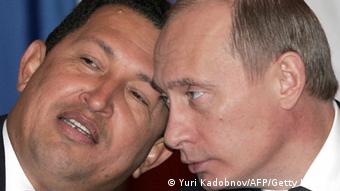 'Act of provocation' against US
'Act of provocation' against US
The fact that Moscow reiterated plans to seek access to the ports of its traditional allies in the region in the midst of the conflict in Crimea, "is, I think, clearly to do with Ukraine," Detsch says, adding that Russia is trying to "nudge out," or at least bother, the US close to home.
"It's first and foremost an act of provocation, directed at the US. But Russia is now also demanding a return on its engagement in the region, which in the past included food aid and weapons being delivered to those countries," she told DW. It can also be seen as a response to NATO's efforts to strengthen its presence in Eastern European member nations close to Russia's borders.
"There's no doubt that Moscow is dead serious about seeking naval bases and port access in Latin America," says Blank. He says the move is aimed at destabilizing the area, with Moscow exploiting traditional anti-US sentiment in many Latin American countries.
Weapons and energy
Blank says the tepid responses in the region are just a "negotiating tactic" and that "the Russians bring a lot of money, influence and power to the table, so whatever the initial responses, it's not the final word." And while Latin America is not the most important region for Russia's great-power ambitions, Russia sees a "real opportunity here and at low cost."
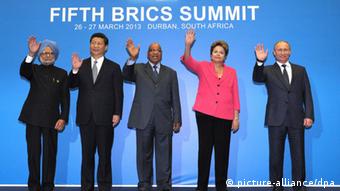 Arms sales and energy are Russia's trump cards in the region. While exporting gas to the region would be a logistical nightmare, "Russia is going to develop and take equity ownership [in energy companies]...most of Venezuela's oil, for example, goes to the US, so the Russians would then be owners of some of that oil, they think they can gain leverage on American economics," says Blank.
Arms sales and energy are Russia's trump cards in the region. While exporting gas to the region would be a logistical nightmare, "Russia is going to develop and take equity ownership [in energy companies]...most of Venezuela's oil, for example, goes to the US, so the Russians would then be owners of some of that oil, they think they can gain leverage on American economics," says Blank.
Since 2001, Russia has made efforts to revive its ties with former Soviet allies in the region as well as regional heavyweights Brazil and Argentina. Sealing multi-billion-dollar arms deals, bringing in Russian energy expertise and holding joint military maneuvers with Venezuela and other countries in the region have made Russia a force to be reckoned with.
Conflicted relationship
The latest developments in Ukraine leave those countries in a quandary. Detsch says Latin American states are usually in favor of non-intervention and not meddling in other countries' affairs. "We saw that in their responses to the crises in Libya and Syria, they were against intervention." Similarly, reporting on Crimea there has been largely neutral, emphasizing the need for a political solution.
But, she agrees that cooperation with Russia, remains important, leading to a somewhat conflicted relationship. Brazil, for example, has said it wants to continue working with Russia in the BRICS (Brazil, Russia, India, China and South Africa) forum, while emphasizing the need for dialogue on Crimea.
Ultimately, though, Russia is determined to stay in the region and the countries there "get a lot of benefits…from their association with Russia and since they are temperamentally and ideologically disposed toward anti-Americanism, they will ride the Russian - and the Chinese horse for that matter - as long as there is a pot of gold at the end of the finish line," Blank says.
Filling the void
And it certainly seems like no one is stopping Russia, as both the US and the EU have neglected Latin America in the past decade, if not longer.
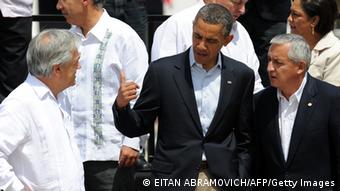 Barack Obama's time in office has been a great disappointment for Latin America, so "at the moment, there is no concept, even a speechlessness between the US and Latin America," Detsch says. The Cold-War mindset is still alive and well on both sides, she says.
Barack Obama's time in office has been a great disappointment for Latin America, so "at the moment, there is no concept, even a speechlessness between the US and Latin America," Detsch says. The Cold-War mindset is still alive and well on both sides, she says.
"There's a historic tradition now, it's not just Obama but [George W.] Bush too, to neglect Latin America or take it for granted, that creates a vacuum and the Russians are filling it."
Russia is "feathering its nest," Blank says. After the fall of the iron curtain, many believed Russia would fall into place and slot into a new, Western world order. But, Blank says, "Ukraine proves that Russia does not want to be integrated, it wants to restore the empire and it wants a totally free hand."
Date 24.03.2014
Author Nicole Goebel
Editor Rob Mudge
Source: Deutsche Welle
Opinion: Obama's obfuscation needlessly confuses allies
- Details
- Category: Current Issues
- Created on Sunday, 30 March 2014 00:00
- Hits: 7455
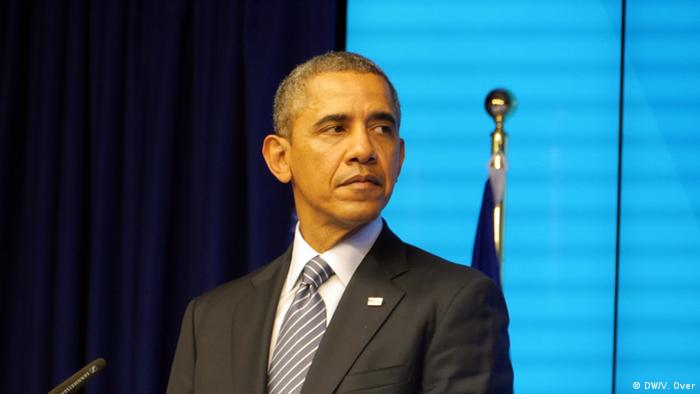 Opinion: Obama's obfuscation needlessly confuses allies
Opinion: Obama's obfuscation needlessly confuses allies
Rhetoric backed with little substance from US President Barack Obama pleased Europeans but disappointed Saudi Arabia's leaders. Allies would be less confused if Obama let out his hidden realist, says John C. Hulsman.
For my sins, I have written 86 articles on the foreign policy of US President Barack Obama. Over time - much as a batter in baseball figures out an opposing pitcher by their last time up - I have divined the president's rhetorical playbook. And trust me, it never changes. This is an orator who is very good in a set-piece environment that he controls - his regard for teleprompters is legendary - but he is far less good at speaking off the cuff. The president's rhetorical pattern is truly set in stone.
The playbook goes something like this: The president carefully constructs a straw-man opponent, at first rather precisely describing them - which is a facet of his work that gives him instant credibility. However, he then assesses the key elements of their arguments in a remarkably simplistic manner, seemingly striking down his opponent's world view with a single blow. Having accomplished this Herculean feat, he indulges in expansive rhetoric, pleasing and almost wholly devoid of policy substance - describing a world that has never existed, pretending the new age is just around the corner, if we only will it into being - the notion of "hope" being crucial here.
As an admirer of Orwell, I have always been distrustful of the president's approach, well aware that a multitude of sins can be hidden by such a rhetorical sleight of hand. In the longer run, confusing people merely angers them, and hard-won credibility is squandered.
A foreign policy variation on the theme
This deliberately opaque all-things-to-all-men approach explains both why the president's trip to Europe has been a general success and his visit to Saudi Arabia ends as a qualified failure.
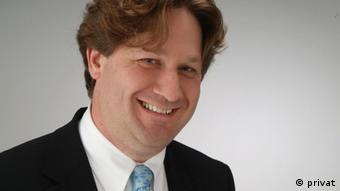 In the case of the president's primary European address, the straw man was realism. First, President Obama smartly made the point that realists do not feel that significant involvement makes a lot of sense in Ukraine. He then turned on a dime, refuted that as an archaic view of the world, and proceeded to talk expansively about the storied past of NATO, and that the United States would not turn its back on Europe.
In the case of the president's primary European address, the straw man was realism. First, President Obama smartly made the point that realists do not feel that significant involvement makes a lot of sense in Ukraine. He then turned on a dime, refuted that as an archaic view of the world, and proceeded to talk expansively about the storied past of NATO, and that the United States would not turn its back on Europe.
Yet almost no leading American neo-cons, Wilsonians, or realists would have argued with any of this. However, the crucial fact is that while the president talks like a Wilsonian about Ukraine and much else besides, more often than not he has acted like the realists he denigrates. The day before his speech, Obama sensibly said exactly what he should have at the beginning of all this: Due to Article V, America will fight for its NATO allies. However, it will not do so for non-NATO European countries. The arch-realist George Kennan himself could not have drawn a clearer or more credible line for Russian President Vladimir Putin. For all his talk of not forgetting Europe, here was a president prepared to live in the real, imperfect world we actually inhabit, not seeing all European states as equal, and basing such a grounded view correctly on the notion of American national interests.
As ever, his European performance was wholly intellectually confusing. But also as ever, it serves a very concrete tactical purpose. The president may be a closet realist, but his supporters in the Democratic Party are not; the mainstream remains resolutely Wilsonian. While the president knows better, he throws rhetorical meat to the base, always making sure not to cross its Wilsonian impulses too overtly, or too directly. Given the looming mid-terms and Obama's sagging poll numbers, the last thing the White House needs is a domestic fight with his dwindling band of supporters.
Fortunately for the president, his contortions between rhetoric and reality suited his European hosts. Ironically, they want to sound principled while not risking too much either, due to their dependence on Russian gas and links to the Russian economy. Pivotal Germany gets over 30 percent of its gas from Moscow, and a whopping 300,000 jobs are directly dependent on German-Russian trade. As such, President Obama's pleasing if vague rhetoric can be bought into, while concrete realities mean that not much of anything will be done about non-NATO European states.
The Saudi counter-example
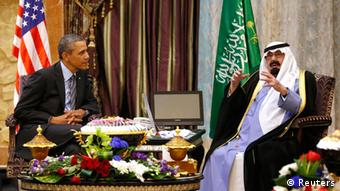 If the Europe trip went right because of shared transatlantic tensions between Wilsonian rhetoric betrayed by realist facts on the ground, the same dynamic ruined the follow-up: Obama's brief visit to King Abdullah of Saudi Arabia. The Saudis, perhaps not quite as practiced in rhetorical acts of misdirection as the White House, have actually had the nerve to hold the president accountable for what he has said - contrasting it with what he has done - and found him wanting.
If the Europe trip went right because of shared transatlantic tensions between Wilsonian rhetoric betrayed by realist facts on the ground, the same dynamic ruined the follow-up: Obama's brief visit to King Abdullah of Saudi Arabia. The Saudis, perhaps not quite as practiced in rhetorical acts of misdirection as the White House, have actually had the nerve to hold the president accountable for what he has said - contrasting it with what he has done - and found him wanting.
King Abdullah has never gotten over the fact that after drawing a red line in Syria, the president scurried away from it as soon as he possibly could. Nothing that is happening in Syria, grim as it has been, is worth America getting involved in yet another land war in the Middle East. Just as in Ukraine, I entirely agree with what the president has done; however, like King Abdullah, I am dismayed with the misleading rhetoric that accompanied it, as it has needlessly alienated a central ally in the Middle East.
For all that we disagree with the king over, including Egypt, the Arab Spring, Bahrain, Syria and Iran, there is much to be done with Riyadh over the vital issues of maintaining a stable price and supply of oil and counter-terrorism. A less furtive realist approach would almost certainly have worked better. However, to do that would be to admit the world is as it is, and then strive to make it better from there. Sadly, given his hidden realism, that is just not a part of the Obama team's playbook.
John C. Hulsman is a Germany-based political scientist, who heads John C. Hulsman Enterprises, a global risk consulting firm. He was also an Alfred von Oppenheim Scholar in Residence at the German Council on Foreign Relations in Berlin.
Date 28.03.2014
Author John C. Hulsman
Editor Sean Sinico, Emily Sherwin
Source: Deutsche Welle
MH370: airline concludes 'with prayers and condolences' that all hope is lost
- Details
- Category: DateLines
- Created on Tuesday, 25 March 2014 00:00
- Hits: 3363
 MH370: airline concludes 'with prayers and condolences' that all hope is lost
MH370: airline concludes 'with prayers and condolences' that all hope is lost
Amid fears of further Russian military moves in Ukraine, G7 meets in The Hague without Russia for the first time since 1998
Julian Borger in The Hague and Nicholas Watt
Malaysian embassy in Beijing picketed after officials announce plane crashed in remote Indian Ocean with no chance of survival
Paul Farrell in Sydney, Tania Branigan in Beijing and agencies
Malaysia Airlines officials offered their “prayers and sincere condolences” to family members of passengers on board flight MH370 after authorities said they had concluded that the missing plane crashed in the remote Indian Ocean with the loss of all 239 people on board.
{sidebar id=10 align=right}Grief-stricken families and friends marched on the Malaysian embassy in Beijing after being given the news by Malaysian authorities.
The Malaysia Airlines group chief executive officer, Ahmad Jauhari Yahya, said at a press conference: “My heart breaks to think of the unimaginable pain suffered by all the families. There are no words which can ease that pain.”
“Everyone in the Malaysia Airlines family is praying for the 239 souls on MH370 and for their loved ones on this dark day. We extend our prayers and sincere condolences."
Yahma added that whether or not he would resign was “a personal question” that he would consider later.
At the Malaysian embassy in Beijing, Chinese police moved journalists away as distraught relatives staged a two-hour protest.
Australia, where the search is now headquartered in Perth on the west coast, said visa fees for family members of passengers flying in would be waived. The Australian defence minister, David Johnston, said the search effort now included aircraft from Australia, New Zealand, China, the United States, Japan and South Korea.
“The challenge of flying to such a remote region and conducting search operations cannot be overstated. With eight hours of flying to and from the search region, the fleet of P-3 Orion aircraft and other military aircraft have only a precious few hours to scour the search tracks they have been given by Amsa [the Australian Maritime Safety Authority]."
Final confirmation of the disaster came after 17 days and was based on unprecedented analysis of "ping" signals sent to a satellite as the plane continued flying after disappearing from radar when its main locating beacons stopped operating and it veered off course between Malaysia and Vietnam.
As the search for wreckage continues a race is under way to find the black box recorders from the plane. The cockpit voice recorder and a data recorder emit a high-pitched ping underwater for at least 30 days after a crash.
The Australian and US navies are each sending equipment to the search area to hunt for the signals – the Americans dispatching a “towed pinger locator", a cylindrical microphone that is towed behind a ship in a grid pattern and can detect a signal up to two miles away. The Australian navy said it was deploying vessels equipped with acoustic detectors capable of picking up the audible beacon.
"We've got to get lucky," said John Goglia, a former member of the US National Transportation Safety Board. "It's a race to get to the area in time to catch the black box pinger while it's still working."
Australia was forced to temporarily suspend all search operations for the missing plane on Tuesday while waiting for an easing of wild seas, heavy rain and gales in the southern Indian Ocean.
The family of the Australian passengers Rod and Mary Burrows spoke to journalists in Queensland on Tuesday and asked that their privacy be respected. “The love and compassion that they shared and their priority of putting their family first will help us get through this together,” said their son Jayden Burrows.
“Our family appreciate all the well wishes and prayers but now we ask for privacy and we request that our wish for family solitude be respected at this time.”
Source: The Guardian UK


